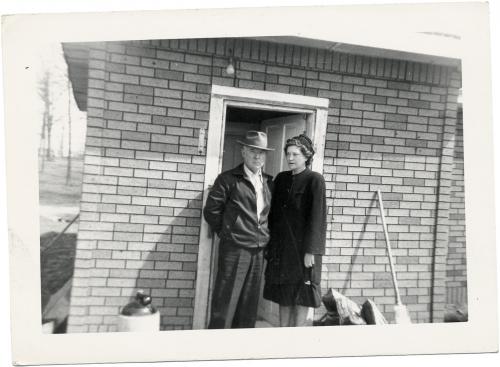Owners of dishes used in serving meals during the three days of the
Catholic church bazaar are asked to call at the Donovan Hall and take them away.
Langdon Courier Democrat, 11/24/1904
Permalink
SCHAEFER MAN'S HAND NEARLY BLOWN AWAY
Schafer, N. D., Oct. 15.—While Carl Cryte and John Brice, living near Berg, were riding in an empty hayrack the former had his left hand partly blown off and his right arm and the lower part of his face punctured with shot as a result of the discharge of a shotgun they had taken along with which to shoot some chickens they had seen while returning with a load of hay on the trip previous to the one when the accident occurred.
He was rushed to Ray, and accompanied by his father, Ole Cryte who has a farm southwest of Berg, where the thumb and index finger were amputated and at last accounts he was as easy as could be expected, with the exception of the right arm where shot penetrated to a considerable depth.
Bowbells Tribune, 10/16/1914
Permalink
SCHOOL TEACHER WOUNDED IN FOOT
Williston, N. D., Dec. 6.—Miss Zora Centerwall, a teacher in Missouri Ridge township near here, was wounded seriously in the foot when a shotgun in the hands of a pupil was discharged accidentally. The boy planned to shoot jackrabbits and was loading the gun after school was dismissed. The teacher was brought to a hospital here.
Golden Valley Chronicle, 12/10/1915
Permalink
CUTS THROAT WHILE ASLEEP
Farmer Wakes to Find He Has Attempted Suicide.
With a gash seven inches long and through the windpipe in his beck, four ugly cuts through the arteries of the wrist and seven punctures above the heart, Ole J. Germundson, a Sawyer farmer, is lying at the Ward county hospital at Minot on the fair road to recovery.
Germundson slept Saturday night at the Merchants hotel in Sawyer and was discovered in the morning lying in a pool of blood.
The tale he tells, which is carried out by the wounds, is one of the most ghastly ever heard by the professional men of the city. He claims he awoke from a sound sleep only in the morning to find himself attempting to carve his body up. Seven jabs were made at his heart with a rusty knife which he carried, but none of them took effect, only penetrating the skin. The man then gashed both wrists, cutting through the large arteries which run through that part of the body. Not satisfied with this he made a slash at his neck. The first cut merely cut the skin and did not penetrate as far as the man desided {sp}. The knife was then inserted below the right ear and drawn across the neck to the other ear, making a gash seven inches long, and when his head was thrown back, four inches wide.
It extended down to the windpipe in one place cutting through a portion of the cartilage surrounding the channel.
When interviewed the man claimed that he had no intention of committing suicide, but that he awoke to find that he had done the deed. He claimed that the idea was so strong upon him that he could not stop. He said that last year he had the typhoid fever and that he has not felt right since. He also stated that he felt another attack coming on. It is believed that the previoous {sp} illness had some effect on the man's reason.
Golden Valley Chronicle, 12/5/1907
Permalink
Prisoners in the
Morton county jail plotted a mutiny, recently. They made clubs and gags from their cell furniture, and were all ready to revolt, when the sheriff happened to overhear their plans. In the evening he made his way to their cells, and demanded them to give up their implements of war. They refused, and he played two streams of ice cold water on them, until they looked like drowned rats, felt like icebergs, and were willing to give up.
Bismarck Tribune, 11/3/1893
Permalink
Stanley—Leaping from the washroom window of an eastbound Great Northern train, Morris Stampfler, 40, committed suicide. He was picked up unconscious by the crew of a following freight train and died in Stanley. Letters pointed to ill health as the cause of the action. Relatives live in
Fife Lake, Mich.
Cavalier County Farmers Press, 12/2/1920
Permalink




